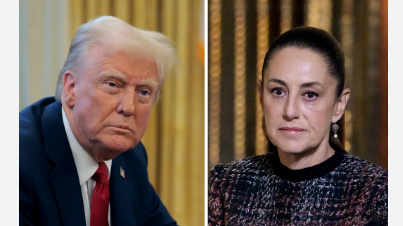Washington (Web Desk/ Agencies): The United States (US) and Mexico have agreed to a one-month pause on tariffs, following discussions between Presidents Claudia Sheinbaum and Donald Trump.
However, the negotiations with Canada remain unresolved, heightening fears of a global trade conflict. As part of the agreement, Mexico will step up its border security efforts, deploying 10,000 National Guard troops to combat drug trafficking, particularly fentanyl.
This action comes as a response to US concerns about the flow of illegal drugs across the southern border. Sheinbaum expressed that the conversation with Trump was conducted with mutual respect, emphasizing Mexico’s sovereignty and the importance of these collaborative efforts.
Trump confirmed the delay in tariffs and described the talks as cordial, stating that both nations would use this one-month period to engage in further discussions.
The two leaders also touched on the issue of weapons trafficking, with the US agreeing to work with Mexico to curb the flow of high-powered firearms across the border.
Despite the positive tone of the meeting, Trump also reported a less productive conversation with Canadian Prime Minister Justin Trudeau, with ongoing disagreements over trade and tariffs.
The tariffs, originally imposed on Mexico, Canada, and China, were framed by Trump as necessary measures to address threats from illegal immigration and drug trade.
Though US data shows that drug trafficking from Canada is minimal, Trump has continued to argue that these tariffs are part of a broader effort to protect American interests.
The tariffs, which also include a 10 percent levy on energy imports from Canada, have sparked concerns about their economic impact, particularly the potential rise in prices for US consumers.
In a tweet, Trump acknowledged that the tariffs might cause economic discomfort but maintained that the long-term benefits of securing US interests would justify any short-term pain.
Meanwhile, both China and Mexico have vowed retaliation, and Canadian officials have already announced plans for significant countermeasures, including imposing tariffs on American goods.
The US trade deficit with Canada, estimated at $55 billion for 2024, remains a contentious issue, with Trump pointing to this as a sign of the unfair treatment of the US in global trade.
Trump’s suggestion that Canada could become the 51st state, citing the large financial subsidy the US provides to Canada, has ignited backlash, including protests from Canadians.
Trudeau responded with a warning of retaliatory tariffs on American goods, further straining relations between the two countries.
The Canadian provinces have also begun implementing measures in response, with some halting US liquor purchases and others considering broader actions.
As negotiations continue, the future of US-Canada trade remains uncertain, and Sheinbaum indicated that Mexico has already prepared a backup plan of its own, which could include additional tariffs or other trade measures.
Meanwhile, the EU has expressed its intention to firmly respond to potential tariffs from the US, signaling that the trade tensions are likely to spread beyond North America.
It remains to be seen how these ongoing discussions will play out, but the economic consequences of a prolonged trade war could be significant, particularly if the US experiences the kind of price hikes that many experts predict.
The global trade landscape is being reshaped by these new tariffs, and it’s unclear how far these measures will go before reaching a resolution.


